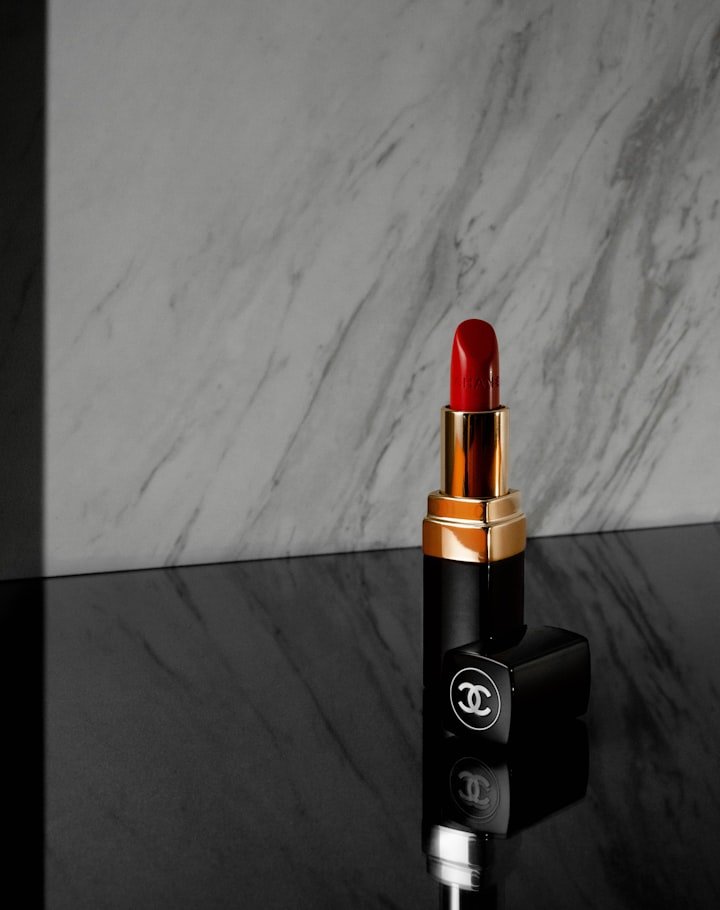How a Lipstick Named Gabrielle Fixed My Broken Self
Until then, facing my reflection pained me
If I’d broken my leg, things would have been entirely different.
What is it about a plaster cast that allows strangers to ask what happened? A broken arm, from a slip on the ice. A fractured femur, the result of a skiing accident. Suddenly, the boundary of appropriate questioning breaks down into curiosity, then sympathy. Or the sharing of a similar experience, and comments about healing times and rehabilitation.
When your face is smashed in, when you’ve sustained a head injury and you look like a prize fighter, the questions go unasked and are replaced by whispered assumptions, sorrowful sighs, and sometimes, if you’re lucky, some unexpected kindness.
________________________________________
I walk up to the Chanel counter at my favorite department store. It’s the one I’ve shopped at for years, and I know the full-time cosmetician. Candace is almost twenty years younger than me, but we share a love for bright red lipsticks and the brand’s fragrances, and we greet each other like old friends.
But today, Candace isn’t here. In fact, there’s no one behind the counter. I realize it’s first thing on a Saturday morning; I witnessed staff pushing back the folding metal doors as I walked up from the subway. Still, it’s odd; I’m alone.
I’m shopping for just one thing, or perhaps several if they will do the trick. See, I broke my face—that is, my nose, my cheekbones, and my head—and it’s my first time out in public since my accident. In the mirror, I see Frankenstein’s monster, or the loser of a ten-round lightweight boxing match. I want to buy some miraculous concealer to help cover up the magnificent bruising that frightens even my reflection.
Two sales clerks saunter over from another counter. They’re young, and they’re clearly in the middle of a spirited conversation, gasping and giggling as they arrive.
They acknowledge my presence with a dropped-penny silence. The women stop, and their faces cloud over.
“Can I…help you?” the taller woman stutters. She quickly glances into my eyes, then drops her gaze to the countertop.
“Do you know if Candace is working today?”
“Candace…no.”
The second woman busies herself at the edge of the counter. She turns her back to me. She is fiddling, rearranging perfume boxes, making work.
“No, she’s not working, or no, you don’t know?” I ask.
“No, I don’t think she’s working until noon.”
I would have to wait more than two hours. I had hoped for Candace’s help; I wanted to tell her what happened, how I’d been hit in the face with a dog toy traveling at rocket speed. I anticipated her expression when I told her I was concussed and my nose was broken. I knew her jaw would drop. Candace knew my face, more intimately than many. She had applied makeup, and recommended eye crème, and touched my skin with her fingertips many times over the years.
But my stamina has been curtailed by my head injury. The subway journey and the fluorescent store lights have already left me exhausted and overwhelmed. I can’t wait. But I need assistance.
“Well, maybe you can help me,” I say. She still refuses to look at me. “I’m a friend of Candace’s. I need a concealer or something to help cover up my bruises.”
“OK, concealer,” she says. “Let me get some samples.” She walks to the side counter, where the samples are laid out. The other woman follows her. Their backs are turned. They’re whispering. I know it’s about me, about my face, my grotesque appearance.
Together they carry back two concealer sticks, small square bottles of foundation, some powder compacts—lavender, green, yellow shades. The tall woman asks me to sit down at the makeover demo area, in front of a mirror with fancy lights around its frame. I dutifully park myself in the chair, thinking makeover is an understatement.
The accident has transformed my face into patchwork: solid black raccoon masks around my eyes; blackened-magenta cuts searing my nose, and rusty-brown-wine mottled cheeks that fade into sallow green as the contusions creep down my neck to my chest.
“Do you want to try some of these on yourself?” she asks. “A concealer, maybe then a foundation? Or these powders—they can reduce the look of dark spots.”
“Dark spots,” I repeat, a grim smile pulls across my lips. “My face is an entire gallery of dark shades. What would you recommend?”
“Well, I don’t want to tou--, I mean, I don’t want to hurt you,” she blurts out. Obviously, I think. Of course she doesn’t want to touch me. She’s afraid of me. I look like a monster.
“How about you try, and I’ll tell you if it hurts,” I suggest.
She pauses and scans my face, searching for something normal she can work with.
“It was an accident,” I explain, feeling the need to break the awkward silence. “It’s healing.”
Silently she begins, applying a pink-ivory foundation on one side of my face. The brush she is using flits against my skin like a dove’s feather. Pink-ivory makes the bruising appear darker and purple-black. She stands back to appraise her work, then without commenting, chooses another color—this one a yellow-beige. Another soft baby brush sweeping across the other side of my face. The yellow turns the bruises an avocado green. The affect makes me want to vomit. I look reptilian.
She sighs, long and deeply. “I’m not sure either of these work,” she says to my reflection. “What do you think?”
I want to cry. I want the paint off my face, and I want giant sunglasses and I want to go home.
“I hate this, thank you for trying, but I hate it.”
“I can remove it for you,” she sighs again. “I’m sorry.”
I want to ask her if she is sorry that the colors don’t work, or if she’s feeling sorry for me, or if she’s sorry that she’s had to attempt this disastrous chore.
She walks to the other side of the kiosk for some makeup remover and a tissue. The other woman is there, and the whispers resume. I just want to leave.
The woman returns and gently, oh so gently, cleanses my cheeks. Again, her touch is like butterfly wings; she neither pulls at my skin nor engages the pain that lies just below its surface.
She finishes up and looks into my eyes. “I am sorry we couldn’t help. I hope I didn’t hurt you.”
“It’s ok,” I reply. “Thank you for trying.” I stand up to put on my jacket.
“I know it might sound weird, but…” she started.
“Yes?”
“Would you let me try some bright red lipstick on you?”
“Yes, that is weird,” I laughed. “I mean, look at me.”
“You have beautiful lips, so why not try?”
I return to sitting, and she pulls a color from the palette. She cleans it, then strokes it onto my lips with the same gentleness as before. She steps back and smiles. Gabrielle, the color is. A bright, clear red.
“Gabrielle is my mother’s middle name,” I tell her, marveling at my smiling reflection. “You know, this is just perfect on me. I’m feeling a bit better already.”
About the Creator
Catherine Kenwell
I live with a broken brain and PTSD--but that doesn't stop me! I'm an author, artist, and qualified mediator who loves life's detours.
I co-authored NOT CANCELLED: Canadian Kindness in the Face of COVID-19. I also publish horror stories.







Comments
There are no comments for this story
Be the first to respond and start the conversation.